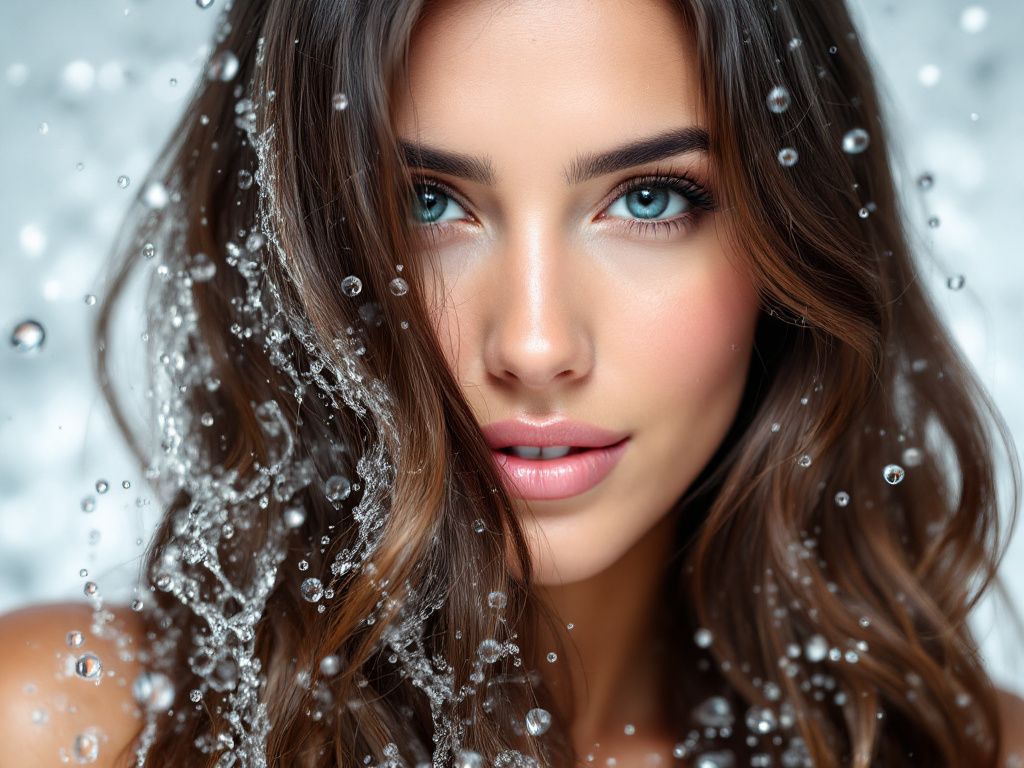
Alright, let’s talk about something that’s really got people scratching their heads – no pun intended! Have you ever noticed that your hair doesn’t always behave? Maybe it’s a bit dull, stubbornly frizzy, or just refuses to shine no matter what magic potion you slather on it. Could hard water be the culprit? Yep, that might just be it. We’re diving into understanding hard water hair damage today, unraveling its mysteries and the havoc it can wreak on our beloved locks.
What the Heck is Hard Water?
Let’s kick things off by simplifying what hard water is. It’s essentially water that packs a punch in terms of minerals – particularly calcium and magnesium. Now, don’t get me wrong; minerals are great for a lot of things, just not so much when they’re ganged up in your water supply.
When water travels through rock and soil, it picks up these minerals like a hitchhiker. So, when you wash your hair with hard water, you’re actually coating it with tiny mineral deposits. And believe me, these minerals have a party that’s anything but fun for your hair.
How Does Hard Water Affect Hair Health?
Let’s break it down. Think of your hair as a sponge, eager to absorb whatever it comes into contact with. Now imagine dunking that sponge in a mineral cocktail every time you shower. Over time, this constant exposure can seriously tangle with your hair’s natural health and vibrancy.
Mineral Residue and Hair Texture
Those pesky minerals build up on your hair shaft and scalp, leaving a residual layer that can weigh your hair down. It’s like wrapping each strand in a teeny tiny stone suit. This not only makes hair feel rough and matted, but harder to style, too.
Clogged Hair Follicles
A real bummer happens when mineral deposits block your hair follicles. Picture this: you’re trying to push a juicy smoothie through a blocked straw. That’s your hair follicle trying to push out natural oils but getting blocked by mineral buildup. Over time, this can hinder hair growth and even lead to thinning.

Color Fading and Dullness
For all you with color-treated hair, hard water can be your worst enemy. Those vibrant hues you worked hard for can wash down the drain faster if the water has high mineral content. This mineral medley can strip color molecules right out of your strands, leaving you with a lackluster mane faster than you’d like.
Increased Hair Breakage
With hard water, your hair becomes more prone to dryness. It’s like watering a plant with soda instead of plain water – not so nourishing, right? Dry, brittle hair leads to breakage, split ends, and a general increase in bad hair days.
Recognizing the Signs of Hard Water Hair Damage
Is your hair trying to tell you something? Let’s suss out some clues that your hair care woes might be hard water-related.
- Tough Tangle Trouble: Hard water can make your hair more tangled than untangled headphones in a gym bag.
- Cranky Curls: Curly hair, time and again, feels less defined and a bit more like a tangled cluster.
- Dreaded Dullness: If you’re relying more on shine serums than ever before, hard water depositions might be to blame.
- Unwanted Color Fade: Fading color is an undeniable sign, especially right after you had that salon-fresh dye.
Taking Action: Combatting Hard Water Damage
OK, now that we’ve laid down the bad news, let’s pivot to more hopeful territory. Here’s what you can try to kick those minerals to the curb.
Invest in a Water Softener

This is one of the more effective methods if you’re ready for a somewhat larger upfront investment. By installing a water softener either at your home’s main water line or just in your shower, the minerals causing all this strife are effectively neutralized before they ever touch your hair.
Clarifying Shampoos to the Rescue
Consider a clarifying shampoo your hair’s version of a deep clean. Use these not more than once every two weeks – you’ll strip away that mineral build-up along with dirt and grime.
DIY Vinegar Rinse
Here’s a nifty trick. After your wash, try a vinegar rinse. Mix one part vinegar (like apple cider vinegar) with eight parts water, pour it over your hair, let it sit, and then rinse it out. It’ll help break down those mineral residues and restore some shine and softness.
Opt for Chelating Ingredients
When you’re scanning shampoo labels, hunt for chelating agents like EDTA or sodium citrate. They’re designed specifically to bind with those metal ions and ensure they’re rinsed right out.
A Few Myths and Misunderstandings
Sometimes, misinformation spreads faster than truth, so let’s set the record straight.
- Myth 1: Color-treated hair is permanently damaged by hard water. Not true! While hard water is tough on dyed hair, you can minimize the damage with specialized care and loyal habit upgrades.
- Myth 2: Any shampoo will remove mineral build-up. Regular shampoos don’t typically get the job done; you need those ones with chelating prowess!
Creating a Hard Water Hair Care Routine

Now that we’ve navigated the issues and dabbled in some solutions, let’s piece them together into a routine that’ll support your moussed mane.
Start Fresh with Weekly Prep
Allocate a day for treating your hair with love. Begin with a clarifying or chelating shampoo to get rid of that week’s mineral adherence. Follow with a nourishing deep conditioner to replenish lost moisture.
Daily Cleansing Considerations
Don’t overwash. Yep, less is more. This reduces your hair’s exposure to minerals and helps retain natural oils. Utilize a mild shampoo in between clarifying cleanses.
Condition Creatively
Reach for leave-in conditioners or oil treatments post-wash; they’re stellar at restoring suppleness and softness.
Explore Non-Water Solutions
Think dry shampoo or co-washing! Alternate between water-washes and dry solutions to reduce mineral contact.
Hard Water Hair Health Recap—What We’ve Unraveled
To wrap things up, let’s circle back a little bit. We’ve talked about how mineral-rich hard water can lead to all sorts of hair hassles—from irritating residue and follicle blockage to depleting color and encouraging breakage.
Understanding these nuances allows us to make serene switches and tweaks. Water softeners become the defense while clarifying shampoos and some trusty vinegar turn into allies. Altogether, they help refresh, remove and remedy those mineral assaults – ultimately saving your locks from becoming needy and knotted casualties.
Hard water hair damage is not something we must silently suffer anymore. Once you’ve got a plan – one that balances water type with hair health – you’re well on your way to dazzling everyone with awe-inspiring tresses. Just remember, each strand’s state is a reflection of meticulous maintenance integrated with healthy habits. Keep at it, and here’s to happier, healthier hair!
Frequently Asked Questions
What is hard water and how does it damage hair?
Hard water is water that contains high levels of minerals such as calcium and magnesium. These minerals can form a buildup on the hair shaft, leading to issues like dryness, brittleness, and dullness. The minerals strip the hair of its natural oils, making it dry and prone to breakage, and can also cause scalp irritation, including itching, flaking, and dandruff[1][2][3).
What are the common signs of hard water damage on hair?
How can I prevent or repair hard water damage on my hair?
To prevent hard water damage, consider using a water softener or a clarifying shampoo to remove mineral buildup from your hair. Applying a hair mask at least twice a week can help restore moisture and shine. A citrus and vinegar rinse can also help lower the hair’s pH and remove mineral deposits. Using a sulfate-free shampoo and a leave-in conditioner with a low pH can also help[2][3][4).
Can hard water affect hair growth and scalp health?
Yes, hard water can affect hair growth and scalp health. The mineral buildup from hard water can clog hair follicles, preventing healthy hair growth and leading to hair thinning and hair loss. It can also cause scalp irritation, including itching, flaking, and dandruff, which can disrupt the natural balance of the scalp and prevent healthy hair growth[1][2][3).
References- Clinikally. (2023). 6 Signs Hard Water is Damaging Your Hair and How to Prevent It.
- Gisou. (n.d.). The Effects of Hard Water On Hair & What To Do About It.
- Healthline. (2020). How to Treat and Prevent Hard Water Hair Damage.
- Kinetico. (2024). What Does Hard Water Do To Your Hair And Skin?.



Leave a Reply